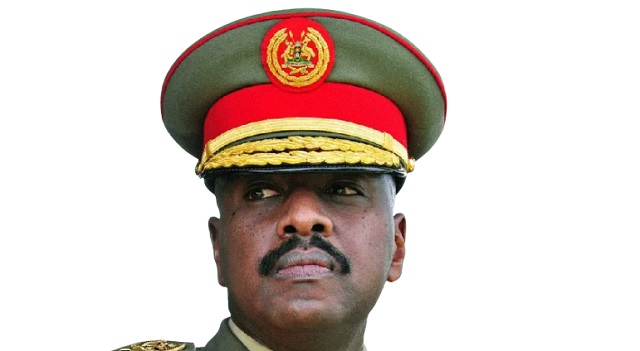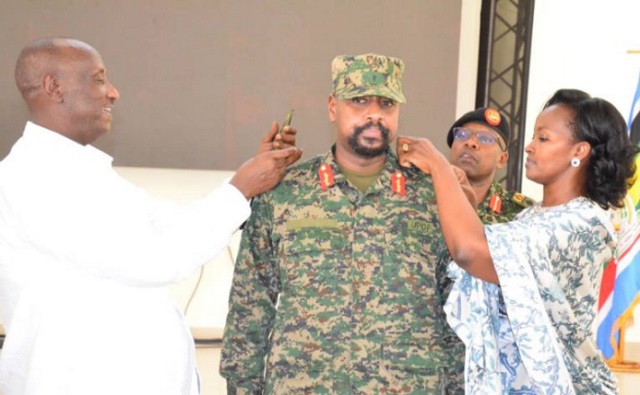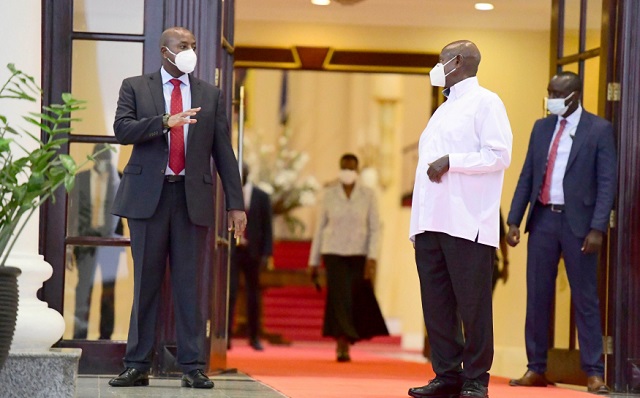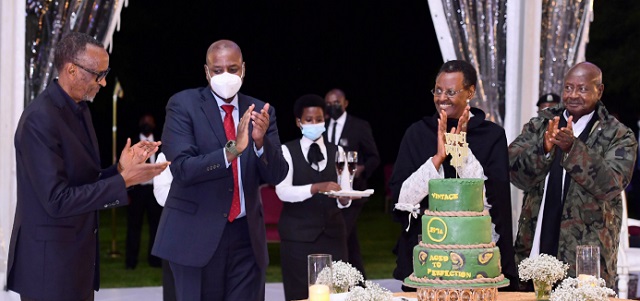
Inside the succession battle ahead of 2026
Kampala, Uganda | IAN KATUSIIME | Until Gen. Salim Saleh appeared at the piping ceremony of his nephew Gen. Muhoozi Kainerugaba, it appeared that veterans of the Bush War in Luwero preferred to stay away from the rabble-rousing erstwhile Army Commander of Land Forces who is also President Yoweri Museveni’s son.
Saleh is arguably the most revered fighter of the National Resistance Army (NRA) that brought Museveni to power in 1986 after a five year guerilla war. Even as post-NRA officers take up leadership positions in the Uganda Peoples Defence Forces (UPDF), the NRA’s successor, Saleh is said to be a unifying figure in the army bridging the gap between those who joined the army with Muhoozi in 1999 and the old guard who have mostly retired.
Known as a trusted confidant of his elder brother and a behind the scenes operator, it was the first time Saleh was speaking publicly about Muhoozi and his role in the army. “Today is a very interesting day for me because finally my friend, MK, (Muhoozi) has the same rank with me,” Saleh said to applause at the ceremony held at Bombo barracks on Oct. 10.
Muhoozi had been promoted by his father to Four-star General. This is the highest rank in the Uganda army and by attaining it signaled the peak of Muhoozi’s rise in Uganda’s military ranks, although not roles. It, however, fueled more speculation on how farther the 48-year-old could rise politically.

The elevation meant that Muhoozi has moved from one star to four star General in a record ten years. In August 2012, Museveni promoted Muhoozi to Brigadier after he completed the six month Executive National Security Program at the South African National Defence College.
At the well-attended event by army top brass, Saleh appreciated Muhoozi’s contribution to the army and noted that Muhoozi had defeated him in one area of the military.
Describing himself as a guerilla commander who has fought using surprise attacks, ambushes, long marches and other forms of infantry warfare, the 62-year-old retired General drew the distinction between his generation and that of Muhoozi.
Saleh referred to a time in 1997 when Museveni intended to create a hellbore unit in Gulu as a way of modernising the UPDF. Saleh told the audience at Bombo that he did not appreciate the concept Museveni wanted but thanked Muhoozi who was about to join the army at the time, for his contribution.
“After that, that is when MK came in and conceptualised the Special Forces Command; that training, the one of combined arms…for us, our generation was fuata nyao (follow the footsteps) occasional and conventional actions,” Saleh noted.
Muhoozi has been the SFC commandant in two stints; first between August 2012 and January 2017 and from December 2020 to June 2021.
The other distinction that filtered through at the event where Muhoozi handed over office as Commander of Land Forces to Gen. Kayanja Muhanga was the larger than life personality of the President’s son who has been politicking since he was named to the top position of commandeering the Land Forces.
Muhoozi has expressed his desire to run for president in 2026 in a break with the convention of the Saleh generation where a declaration by another officer would have brought arrest, charges in the court martial and other punitive actions. However Muhoozi is the President’s son and few expect him to be treated otherwise than the leeway he is accorded.
Muhoozi has set off firestorms through his tweets to the chagrin of many in the army including Saleh’s contemporaries who have adhered to the army’s strict code of conduct that bars them from making political statements.
Saleh attended the dinner hosted at State House Entebbe in April during Muhoozi’s birthday celebrations but he did not speak. President Museveni and First Lady Janet Museveni showered praises on their son and so did the chief guest, Rwandan President Paul Kagame, who even offered to be Muhoozi’s “Twitter Editor.”
Saleh’s initial quietness and later praise of Muhoozi is a reflection of the former guerilla’s character who operates far away from Kampala. But it also captures the nuances of the succession fights at State House that become more apparent by the day.
Museveni at 78 has shown increasing vulnerability while governing by constantly delegating to his brother Saleh and his son, Muhoozi. Succession sentiments have gone on as the nation teems with a young and restless population demanding more from an ageing government.

Muhoozi campaign teams
Muhoozi has firmly stated his desire to succeed his father by contesting for President in the 2026 elections. But Museveni is for all intents and purposes doing the same. Museveni is already in campaign mode for the next election and barring a black swan, he will contest as the NRM candidate as he is wont to. This would mean that Museveni is the biggest stumbling block to Muhoozi’s ambition to capture power. In essence, Museveni and his son are locked in a silent and undefined battle for the same seat. The apparent contradiction has left Ugandans wondering what calculation and maneuvres Museveni and his ambitious son are engaged in inside the walls of State House.
Those at the centre of political machinations of both Museveni and Muhoozi like Balam Barugahara, an events promoter known by his first name, have created more intrigue in the ruling party. Balam is the chief mobiliser of Muhoozi and was active in the latter’s countrywide birthday celebrations which many interpreted as dry runs for a presidential campaign.
The celebrations were organised in Entebbe, Mbarara, Fort Portal and Jinja before Museveni brought them to a grinding halt. As the countrywide celebrations went on for weeks, there was growing angst in the public, the military, and in government over the lavish parties being thrown amidst a host of crises in the country.
Adding to the indignation, thousands of young Ugandans aged 35 and below, whom Muhoozi was ostensibly wooing in his campaigns, remain unemployed.
On September 18 while at the opening of his newly built hotel in Masindi, Balam told Museveni, chief guest at the event, that Muhoozi was a “standby generator” for those who are tired of Museveni.
“If you touch Mzee (Museveni), we have an avenger. So I belong to those millions of avengers. We are not competing with you, we work with you and we shall wait for your guidance for when we can shoot,” Balam told Museveni.
He introduced groups like ‘Team Chairman’, ‘Muhoozi Army’ who are involved in political mobilisation for the First Son. Balam took a swipe at opposition groups led by Bobi Wine, leader of the National Unity Platform (NUP) who contested in the 2021 presidential elections.
Later at another event in Masindi, Museveni praised the organisers of the Muhoozi celebrations and said they were necessary in countering the opposition. “In Kampala, some sponsored Opposition take advantage of the weaknesses of the NRM, for example, supporters (of the ruling party) are beaten up for wearing yellow shirts (official NRM colour) and they keep quiet,” the President told a rally.
He added, “But the MK (Muhoozi Kainerugaba) Group resisted such and, so, I want to thank you for sticking with NRM through Lt Gen Muhoozi Kainerugaba’s birthday celebrations.”
As Muhoozi and teams pour energy and resources into their 2026 campaign, the old guard from the NRA era and senior folks in the ruling party, National Resistance Movement (NRM), who are not enthusiastic about Muhoozi are not sitting idly and watching events unfold.
On Oct. 3, Vice President Jessica Alupo, Minister of Internal Affairs Kahinda Otafiire, Defence Minister Vincent Sempijja and a host of senior NRM cadres endorsed President Museveni as the sole candidate for the 2026 polls.
The move may not have surprised Muhoozi and company but it signaled what is at stake—the generational dichotomy at the heart of Museveni’s succession.
Early endorsements of Museveni by members of the NRM are not new but previously there were never fiercely competing factions in the NRM like is happening today. Alupo is the second highest ranking person in government as vice president, Otafiire is the most senior government official from the NRA owing to his status as a member of FRONASA, the first political outfit Museveni founded in 1971, to fight former dictator Idi Amin. Sempijja, relatively new to government, is no small player by virtue of being defence minister.
The carte blanche Museveni has accorded his son has left many wondering whether Muhoozi is a contingency plan in the event Museveni is no longer in the picture. However Museveni has also applied the leash at certain intervals to rein in what appears wayward behavior.
In June, Museveni called for a UPDF High Command meeting held in Ntungamo where according to numerous reports he told Muhoozi to desist from posting on Twitter about security and political issues outside the country.
Muhoozi in a series of bellicose tweets posted about the brewing conflict in the Democratic Republic of Congo where the country came perilously close to armed conflict with Rwanda. Muhoozi’s tweets had caused a lot of disquiet in the army, something which Museveni has always been very sensitive about.
The tweets infuriated Congolese and others in the region who are wary of the delicate relations in the Great Lakes region where DRC, Rwanda and Uganda lie.
However other analysts say Muhoozi must maintain the momentum he has started if he is to remain a front runner in the race to succeed his father.

UPDF intrigue
President Museveni strongly relies on the UPDF to maintain his stranglehold on power and the army has always been his fallback position. At a time coups are back in fashion on the African continent, Museveni seemed to be clipping his son’s wings when he removed him from the army leadership after a tweet threatening to invade Kenya caused uproar. Museveni is acutely aware of what a lack of action could portend.
Muhoozi has had a meteoric rise in the army courtesy of his father, the Commander-in-Chief (CIC). At the time Museveni called for the High Command meeting, there was wide spread talk of a coup plot although Museveni moved fast to neutralise the talk and the potential schemers.
Taping into national discontent, young and low ranking army officers, some at the rank of Captain, have led coups in Burkina Faso, Guinea, Mali. For the case of Chad where President Idriss Deby was mysteriously killed at the frontline while battling insurgents, his 38-year old son Gen. Mahamat Idriss Deby took over and is currently consolidating power in similar fashion as his father did. However there was wild speculation on whether the son was involved in the incident that ended his father’s 31 year reign.
When Museveni appointed Muhoozi Commander of Land Forces, he made him de facto Chief of Defence Forces (CDF) in the eyes of many because of his relation to the CIC. The Land Forces are the biggest component of the UPDF with its five divisions. Muhoozi was also in charge of Operation Shujaa which is underway in the jungles of eastern DRC to flush out ADF rebels who have wreaked havoc in Uganda.
Whenever there has been any mutinous tendencies in the UPDF or whiffs of it, Museveni has taken quick and decisive action. In March 2013, a clique of soldiers attacked Mbuya military barracks, the UPDF headquarters. The incident was believed to be a coup attempt that was nipped in the bud. The suspected soldiers were arrested and convicted by the court martial but the actual coup plotters remained a mystery.
But in June 2013, Museveni made an army reshuffle aimed at neutralising the putsch. Gen Aronda Nyakairima was dropped as CDF and appointed minister for internal affairs. Gen. Katumba Wamala replaced him. Museveni however made other changes in top army positions to snuff out any lingering dissent.
With or without a top army posting, Muhoozi remains influential in the UPDF and all and sundry are looking out for the next chapter in the silent power dance of Muhoozi and his father.
****
 The Independent Uganda: You get the Truth we Pay the Price
The Independent Uganda: You get the Truth we Pay the Price



The Muhoozi – Museveni political competition maneuvers are not only a political gamble but a risk factor to the Museveni family more so the country that is healing from the brutal dark days of national bloodbath of the swine leaderships. No wonder currently that the political – economic leadership has frequently degenerated into a daily struggle for the control of political power rather than a focus on governance and economic revamping of the sickening economy.
Whereas Museveni family feels that they have a birth right to govern Uganda at whatever cost indefinitely, it should be understood that Ugandans luckily loved Museveni and faithfully rewarded him for his military, political , economic progress that has moved Uganda to a certain class of continental powers. Now Ugandans would be rewarded by the Museveni family for the trust in them at this important juncture in the future of democracy in this country by wisely and peacefully hand over power to the people’s choice, Museveni as a hero of democracy needed to set a pace in Uganda as his contemporaries like Dos Santos of Angola, Moi of Kenya, Nyerere of Tanzania to peacefully retire, hand over power to a person Ugandans Love not imparted on them. This will save Uganda from the brink of chaos, remove the conspiracy of deliberate, selfish centralization of the national political, military and economic power , the bulk of the national wealth in a single family. The Muhoozi being a president in Uganda shouldn’t be a do or die for Uganda, as Uganda is large than the family egoistic chauvinism.
Therefore, Mr. Museveni needs to come up and openly and clear the air on his retirement plans to end speculations and risk of both family and national crisis as whatever happen or decides between Now and 2026 will determine whether our much cherished stability and democracy and progress are consolidated or derailed.